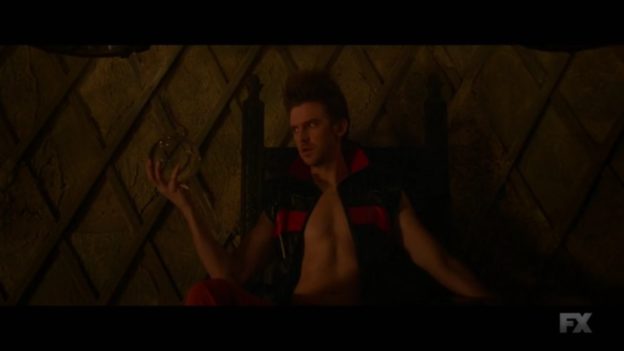Comic book TV is everywhere these days, and it’s happening all year. So I’ll hand out awards and rankings in June, but in the meantime, we’ll be reviewing shows one by one as they wrap up.
This instalment: Got a few more quick entries to knock off here.
Short version: And now, five shows with nothing in common except “Based on the comic book.”
Let’s continue.
Legion
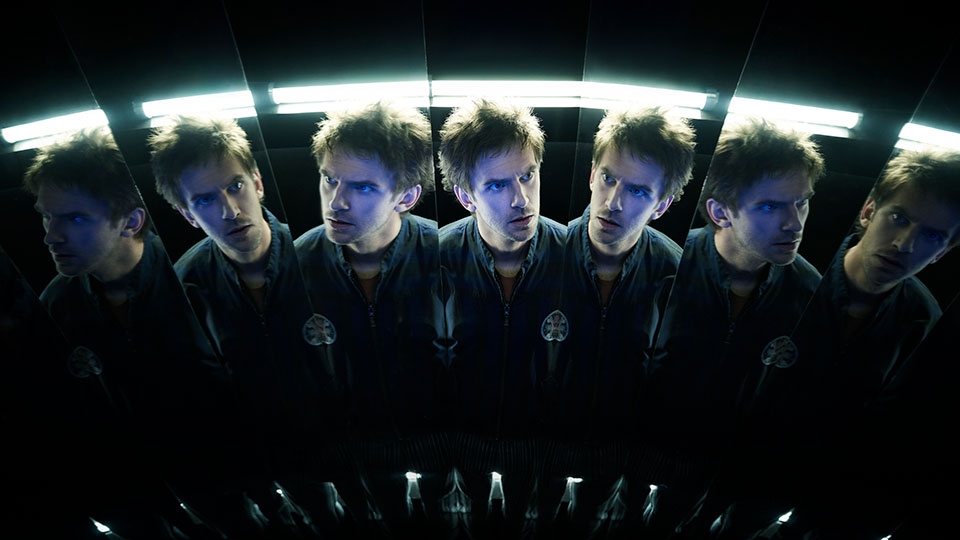
Why haven’t I written a full blog about Legion, you might ask? I mean… you haven’t. I know that. Nobody has asked that, I’m just saying you might. It’s an incredibly rich, thoroughly innovative show that isn’t just unlike other comic TV, it’s pushing the boundaries for television in general.
But therein lies the problem.
There is so much to this show. Nearly every episode of season two, and most of season one, has so much to unpack in terms of story, visuals, how Noah Hawley is challenging our every expectation, that I couldn’t possibly cover it in a single blog post. I can sum it up in a speed round or I can do a podcast where we drill deep into every episode. There’s an episode where after David, our central character, suffers a stunning and tragic loss, we break from the story as we knew it to see a half dozen other ways David’s life could have gone, only to realize that all of these alternate paths are David processing his grief. I could spend a whole post on that episode. So for now, here’s the highlights, and simply know that in not watching it you’re doing yourself a disservice.
What are the basics? In season one, at some impossible-to-name point in the 70s or 80s, mental patient David Haller finds love with a fellow patient, Sydney Barrett (Rachel Keller), then finds out he’s not crazy, he’s an incredibly powerful mutant telepath/telekinetic (teleporter, question mark?). On the run from mutant-hunting government agents Division 3, David joins the Summerland group, a team of mutants led by Melanie Bird (Amy Smart), wife of another telepath Oliver Bird (a delightful Jemaine Clement), and learns that the reason he’s felt crazy all of his life is that since birth, the malevolent telepath Amahl Farouk, aka the Shadow King, has been living in the back of his mind.
And it all gets even stranger than it sounds.
Season two. After finding out he’s lost a year since we last saw him, David rejoins his mutant friends, who have now gone to work with their former enemies Division 3. The Shadow King, no longer in David’s mind, is out to find and reunite with his old body. Which it’s generally agreed would be bad. Thus, Division 3 and the Summerland mutants work together to hunt him down… but a version of Syd from the future wants David to help Farouk get to his body.
And it all gets even weirder. And makes us question how much of the premise and actions of season one we really understood or can trust.
What went right? Most things. The cast was all strong this year, although Amy Smart got a little sidelined, which is unfortunate. The art design, aesthetics, every frame has a style to it… a style often custom-engineered to make the viewer uneasy. The soundtrack was great, featuring several amazing cover songs.
There’s so much. There’s so much. Jon Hamm narrating lectures on delusion, madness, mental illness as plague, that all pay off… and then keep going a little? And then pay off again. Dan Stevens’ performance. Hamish Linklater’s continuing transformation from generic villain to tragic hero. David’s dance fight against the Shadow King’s posse. Navid Neghaban’s complex, layered performance as Farouk, done with hiding behind masks. Bill Irwin and Amber Midthunder as Cary and Kerry Loudermilk. So much. Nobody, nobody is testing the limits of what comic book TV can be like Legion.
That said.
What went wrong? I can’t explain without a certain amount of spoilers. So… read at your own risk.
[spoiler title=’Season two finale spoilers’ style=’default’ collapse_link=’true’]Now… this isn’t ALL bad. Noah Hawley’s onto something with one of the issues his finale raises: did we just assume David is a hero because he was fighting a villain? Should we? But I have some issues here. Lots of shows do the bit where the villain turns the hero’s allies against them, and many do it the way Farouk does here. By revealing secrets the hero had kept, and twisting half-truths and some deceits buried inside them to turn allies into enemies. Agents of SHIELD, Arrow, Preacher, Luke Cage, Legends of Tomorrow… hell, Gotham does it multiple times a year. But the villain isn’t supposed to be RIGHT. There’s supposed to be a way to walk it back. It’s not supposed to take the one relationship that has been the show’s beating heart since the pilot and make us wonder if it was ever what we thought, or if it were something else, something horrifyingly different. Basically… you can twist a plot so hard that it moves past being a shock and becomes a betrayal. A betrayal of the audience, taking away the narrative conventions that let us keep a grip on all of this weirdness and leaving us adrift.[/spoiler]
In short… the finale pulled a cliffhanger that was truly unsettling. And not “How many episodes of Jake Peralta in jail are they going to make me sit through” unsettling, but “Can I still trust this show, or could I ever trust this show?” unsettling.
Still… you can’t love a show for defying all conventions and then decry it for not caring about simple, black-and-white, good guy vs bad guy narratives. Just… they did some things I didn’t care for.
Also “designing an entire season to erode viewer comfort” might not be a strength of the show to everyone.
What should they have done? Well… I don’t want to say “Don’t have done that thing at the end” until I see how season three plays out.
Let’s move on to something simpler.
Supergirl
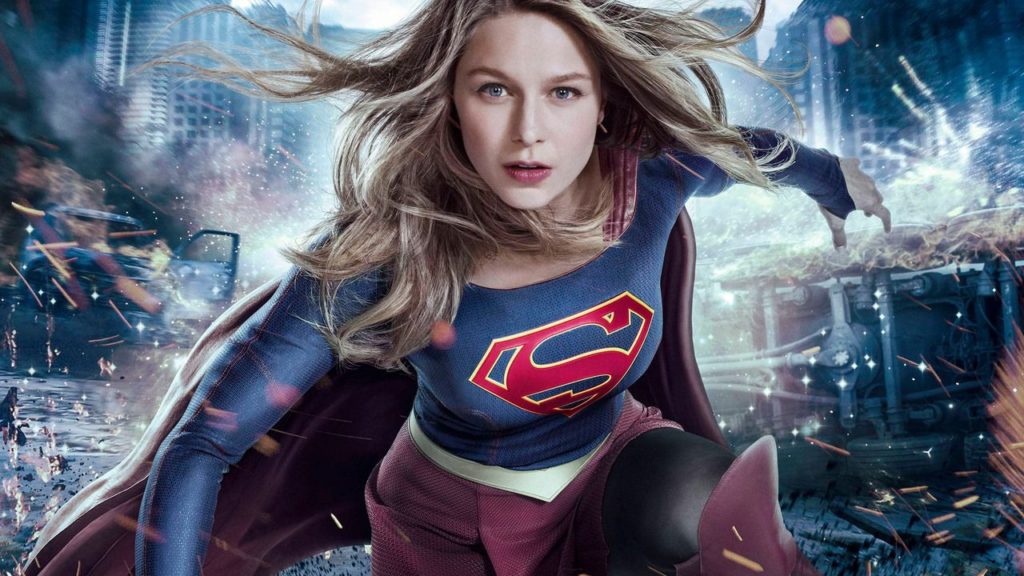
What are the basics? Our theme this year is “family.” Alex Danvers breaks up with the first great love of her life, Maggie Sawyer, over a disagreement about having kids down the road. Winn Schott confronts issues with his estranged parents, including one supervillain. J’onn J’onzz has an unexpected reunion with his father, only to face losing him a second time to… let’s just call it Martian Alzheimer’s. Lena Luthor and our central character, Kara Danvers, try to cling to the surrogate family of everyone I just mentioned, especially since Kara is still getting over losing her boyfriend, Mon-El. But before long things get shaken up. Turns out Mon-El went to the future, where he joined the 31st century’s greatest superteam, the Legion of Super-Heroes, and he’s come back to the past with two teammates: the hyper-intelligent Brainiac 5 and the telepath of Titan, Imra Ardeen, aka Saturn Girl… aka Mon-El’s wife.
More troubling… Samantha Arias, Lena’s second-in-command and latest member of the Danvers extended family (along with her teen daughter), is slowly transforming into Reign, a Kryptonian killing machine known as a Worldkiller. The name is not a hyperbole. Supergirl and the DEO, along with Lena Luthor, try to save Sam from fully becoming Reign, and in the process save the world.
What went right? The cast is still quite charming. Melissa Benoist is great, Jeremy Jordan is super charming, Chyler Leigh is funny and kickass and has ugly-crying-superpowers. Katie McGrath is still killing it as Lena, although I think she might have gotten worse at hiding her Irish accent. Which… that isn’t actually a negative for me, just saying.
I’m liking the new, matured, more confidently heroic Mon-El, and his Legion of Super-Heroes teammates were very well cast. Imra’s good and Brainy’s funny. [Sidebar: More Brainy next season? Yay! Wait… less Winn? Not yay.] Odette Annabelle, who I’ve liked since Cloverfield and even managed to enjoy in the final, half-assed season of House, does great work in the double role of Sam and Reign. Plus Adrian Pasdar dropped by for a few episodes as Lena’s rival, the corrupt media mogul Morgan Edge. Shame he had to drop off the radar halfway through, but it did free him up to go back to Agents of SHIELD.
The Reign arc has a lot of stages. It’s not oppressively static like, say, The Thinker over on The Flash.
Of all the CW shows that don’t rhyme with “Smack Smightling,” Supergirl does the best at tackling political topics. Race relations, immigrant struggles, LGBTQ+ issues, and a much more successful take on gun problems than Arrow managed last year. Something about the exchange between Lena and James made it feel more like a debate and not simply hammering talking points. It might be Katie McGrath, she can sell a great deal.
Everyone staring as Kara, ready to leap into action, slowly unbuttons her shirt instead of dramatically ripping it open. “What?” she asks. “I like this shirt!”
What went wrong? It does feel like Morgan Edge was there to kill time until the Reign arc was ready for its second act. And once Reign had surfaced, he was sent off to prison. Wished off to the same cornfield as Maxwell Lord and Snapper Carr before him.
They are still working on how to use James Olsen. It’s getting better. James and Lena started hitting it off, causing problems for James when Lena and Supergirl had a falling out.
Sam became besties with Kara and Alex a little quick. Like, right away. I feel like she’d known the gang one episode before everyone was lining up to be surrogate aunts to Sam’s daughter Ruby (I’m also lukewarm on Ruby as a character, though I see her value as a plot point). It was like Danny McBride at the end of Pineapple Express*.
And if the DEO develops earplugs that neutralize someone’s scream power, have them remember to bring said earplugs when they’re likely to run into that person.
*Remember? They all go out for breakfast, and Seth Rogen and James Franco are best pals now, and then Danny McBride says “Can I be best friends with you guys too?” and they say sure, ’cause they’re all high, and suddenly we’re pretending he was an equal part of the movie and not, at best, the Leo Getz to their Riggs and Murtaugh**, and then he’s also on the posters, and maybe it’s just because Eastbound and Down had become a thing, but that’s how they thought they could do a follow-up with just McBride and Franco and it was Your Highness and it was awful and you know Natalie Portman at one point thought “I showed my ass in a thong for this?” I’m sure you all know exactly what I mean. Anyway Sam becoming instant co-best friends with Kara and Lena, while important for the story, felt a little like that.
**Oh, just Google it if you don’t know.
What should they have done? I guess if I were to dig into it, maybe a first act that paid off later in the season, rather than a bunch of Morgan Edge stuff that stops mattering halfway through the year. Oh, and no more villains with magic screaming powers. Especially no more villains with screaming powers that are somehow still a threat after the DEO develops a countermeasure.
Supergirl’s fun and charming and unabashedly liberal. Maybe there are a few more ways to nudge it from good to great, but they’re eluding me right now.
Riverdale
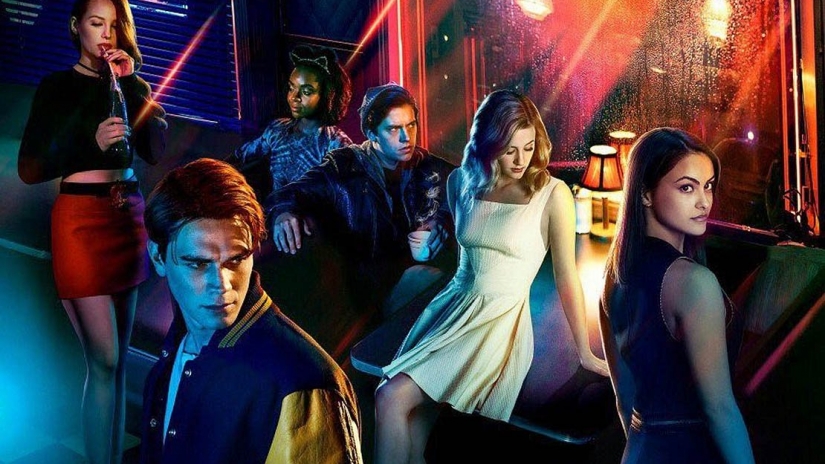
…What even is this show? Why is this show? And why can’t I stop watching it?
What are the basics? Riverdale, the town with pep… no, you know what, you can’t just tell people what happens on Riverdale. Any description of plot points ends up sounding like you’re making fun of the show. I’ll demonstrate. I’ll describe two plots, one of which is real, one of which is a parody, and you guess which is which.
Jughead, as gang leader of the Southside Serpents, challenges the leader of the rival gang the Ghoulies to a drag race for gang supremacy in order to stem their sale of the party drug jingle-jangle, but Archie gets involved and things go both fast and furious.
In an attempt to win over Veronica’s stern father, Archie gives up football to go out for the wrestling team. When that doesn’t work, he tries joining the mafia and helping defend against Montreal drug lord Papa Poutine.
So… which one is real?
Trick question. They both are. Even… especially the parts about Papa Poutine and jingle-jangle. Jingle-jangle is discussed in serious tones all season and by god the cast commit to it. They take the existence of a drug called jingle-jangle that’s served in pixie sticks deadly seriously. And that, readers, is what ultimately works about this show.
They know exactly what show they’re making. They’re making a trashy soap filled with noir mysteries, gothic heroines, vigilante gangs, hooded would-be serial killers (for all of his menace the Black Hood’s success rate is so-so), and a crime lord trying to corrupt and conquer what we’re told used to be a quaint and innocent town, and for some reason they are doing it with Archie characters. I don’t know why the creative head of Archie Comics went to Greg Berlanti and said “I want to make a hybrid of Veronica Mars and Dark Shadows and I want to do it with Archie characters, want to help?” but I’m beginning to see why Berlanti said “Absolutely I do.”
This show is compulsively watchable. Maybe not always (often?) good, per se, but very watchable. It gets into your head, man. You just need to know where they’re going with this.
That said… Season one started with the murder of a teenager and descended into evil nunneries, Archie banging his sex predator music teacher, gang life, secret drug empires, and a little bit of incest. Keep all of that in mind and then hear me when I say that season two got dark.
I didn’t care for Archie’s slide into darkness. Archie’s unflinching goodness, albeit cut with a certain amount of standard teenage dickishness, was one of the strengths of season one, and now he’s forming posses and starting gang fights and joining the mob. Quite the turnaround.
I also don’t like that evil mostly wins here. Sure the Black Hood is caught, but Hiram Lodge’s Sinister Plan to Rule All Riverdale seems to be proceeding unopposed. Well, except for alienating his family, but that’s neither here nor there, and we’ll see if his wife Hermione stays against him for long. Hiram’s got total control now, and it’s not like Betty and Jughead can just call the FBI. If Arrow taught us anything it’s that the FBI won’t take down a criminal organization that has seized control of a city’s government and police unless they also get to arrest a vigilante who is trying his best.
Sorry to be back on that but goddamn Agent Watson, check your priorities.
Okay. Two more. Let’s put the “speed” back in “speed round” so we’re not doing three of these. Time for zombie murders!
iZombie
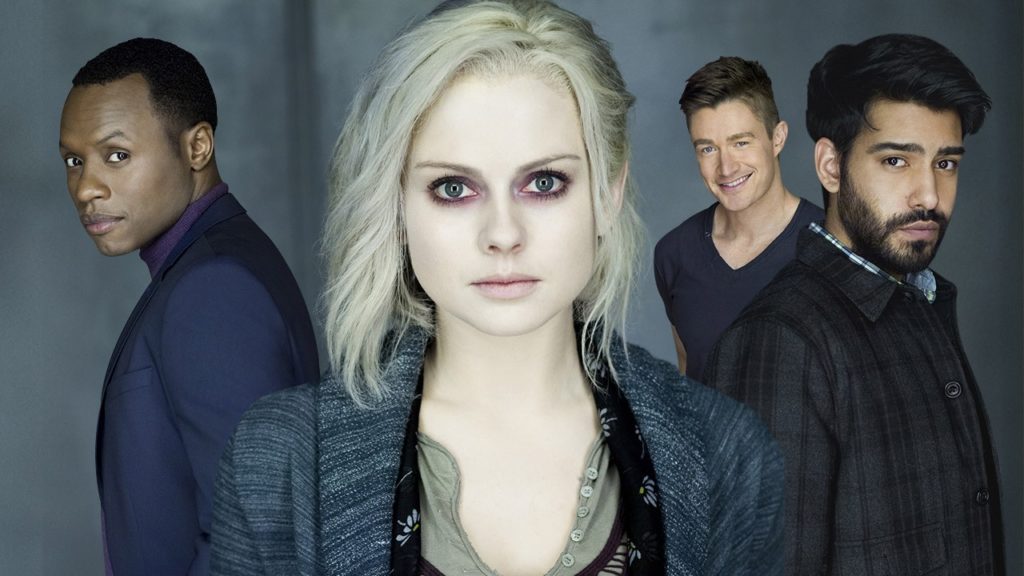
What are the basics? Zombies are not out in the open, since rogue elements of zombie military group Fillmore Graves created thousands of zombies in Seattle. The city is now walled off from the rest of the country, and human/zombie relations are not at an all-time high. In between solving murders with her partner Clive Babineaux, medical examiner Liv Moore finds a new cause: smuggling humans into Seattle so that zombieism can cure their fatal illnesses. Creating new zombies is an act which carries a death sentence, as thanks to certain parties skimming brains for the black market, Fillmore Graves is struggling to keep the zombie population fed as it is. Which creates opportunities for Seattle’s OG morally shady zombie entrepreneur, Blaine DeBeers, and his father Angus, who escapes captivity at the bottom of a well, turns out to have gone crazy in said well, and starts preaching to hungry zombies that humans are naught but food. So… that’s not helping keep the peace.
Geez. For a 13 episode season there was a lot going on this year.
What went right?
-Liv’s boss/confidant Ravi’s attempted zombie vaccine from last season means he goes zombie for about five days out of every month, and his eating brains results in nudist Ravi, heroin addict Ravi, and Instagram diva Ravi, and Rahul Kohli was nailing it.
-What a thoroughly entertaining cast this show has.
-All the lampshade-hang meta-jokes from “Yippee Ki Brain, Motherscratcher!”
-Highest on the above list, instead of a cooking montage, Liv grabs the brain-of-the-week and takes a bite. “What?” she asks Ravi, seeing his stare. “I don’t feel like cooking.”
-This exchange, and Ravi’s desperate backpeddling:
Sorry Ravi, there’s only one guy that can pull that line off. Stream the season finale: https://t.co/QRXZmx80E6 #iZOMBiE pic.twitter.com/TtbYp3pvDQ
— iZombie (@CWiZombie) June 1, 2018
What went wrong?
-I don’t remember Liv’s reactions to specific brains being quite this over-the-top. Like Legends of Tomorrow and levity, Happy Endings and rapid banter, or Legion and subversion of narrative expectations, it may be possible to have too much of a good thing.
-With this many plots, it’s not always easy to progress them all equally, or know which one is most important.
-The show seems to think that Liv the human smuggler vs. Fillmore Graves the oppressor was a clearcut good guy/bad guy scenario, but it was a little more complicated. The fact is that Chase Graves was trying to keep Seattle from being nuked into glass to wipe out the zombies, and every time Liv made a new zombie she made it harder to keep everyone fed, grew the unrest, and sent more hungry zombies to be radicalized by Angus’ Brother Love. So… Liv wasn’t entirely in the right here, and they never felt like acknowledging that.
-There was an inspector from Fillmore Graves named Enzo Lambert, who was some bizarre hybrid of Inspectors Clouseau and Javert. He wore a cape and had a ridiculous French accent and was not helpful in solving murders, and I couldn’t figure out why he existed. And then I saw “Daniel Bonjour” in the guest credits and I thought “Is he a comedian I don’t know doing a bit? Does he have a French character and he’s doing that on the show, like how Steve Smith would guest star on shows under the name Red Green?” But it turned out Daniel Bonjour doesn’t even play Enzo, he plays Liv’s new romantic interest Levon, and now I’m even more confused.
-Liv knew in episode one who was skimming brains, so why did it take until episode 12 to deal with him? Jesus.
What should they have done? As we head into the final season, a clear, central story might help. And maybe if Liv eats the brain of a LARPer, she doesn’t have to speak like King Arthur every goddamn sentence. None of the LARPers they met during the investigation did that.
How we doing? 3100 words. Damn. Maybe I shouldn’t have spent so much time on Pineapple Express.
But I’m not sorry.
Zombies naturally take us to…
The End of the F***ing World
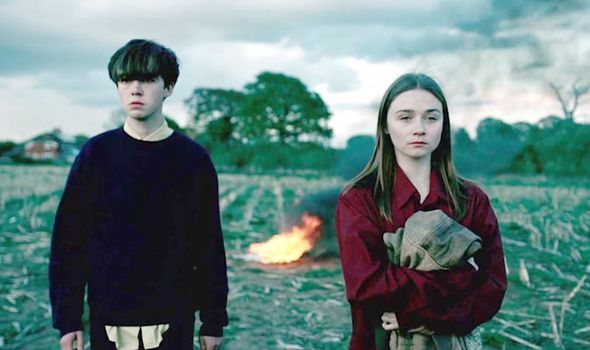
I’ve been reminded that this quirky little show, made in Britain but available on the Netsflix, is based on a comic. Probably much more accurately than your iZombies or Lucifers or definitely Riverdale. So it’s germane to the conversation.
What are the basics? Alyssa is a somewhat nihilistic teenage girl, looking to escape an unhappy home situation. She thinks she’s ready to have sex, and thinks that quiet, withdrawn James is a good place to start. James is pretty sure he’s a psychopath, as he hasn’t really felt anything since his mother died years ago. He thinks he’s ready to start murdering, and thinks that unsmiling abrasive Alyssa is a good place to start.
When Alyssa wants to escape her tuned-out mother and creepy, douchey, potentially or even probably abusive step-father, she and James hit the road together, and meet many terrible people while two female detectives, who are trying to adjust to their relationship recently becoming briefly sexual, chase after them. Things get bleak.
What worked? The two leads are quite good, and make interesting, relatable characters out of, on paper, hard to like teens. The detectives work as well. And the writing’s sharp. The eight episodes fly by. And there’s a good character twist for James, and he begins to figure out what his actual issues are.
What didn’t? Man it gets bleak towards the end.
What should they have done? …Well, unlike a lot of comic book shows lately, they were directly adapting a specific story, so I don’t know what choices they had.
Look, it’s eight episodes, it’s pretty compelling, probably worth checking out.
Okay. Think… think we’re good. Think I’ve covered everything. Nothing left but the rankings and the awards– oh dang. Luke Cage is still almost a week out.
[Checks watch]
Yeah, okay, I can wait. Come along, Luke, let’s see if you’ve got a more a more cohesive season this year.

